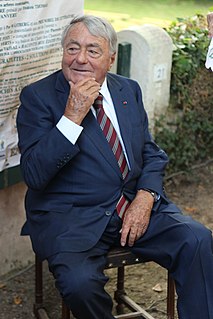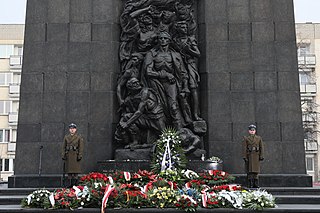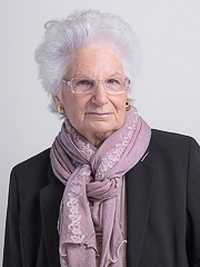Early life
Nieuwsma was born in Sioux Falls, South Dakota, the son of John Nieuwsma, a Dutch Reformed minister, and Jean (née) Potter, a teacher. In 1945, after World War II, his family moved to Bellflower, California. At the age of 5, he met Corrie ten Boom, a Dutch-born concentration camp survivor and author of The Hiding Place, whose family had hidden Jews in their Netherlands home during the war. Ten Boom was a guest at the Nieuwsma parsonage in Bellflower. In a 2001 interview, Nieuwsma recalled "sitting on (ten Boom's) lap...listening to her talk and wondering to myself, 'Who is this woman?' She reminded me of my grandmother." Ten Boom inspired him to learn more about the Holocaust.
Writing career
Nieuwsma started his writing career as a reporter for the Holland (Michigan) Evening Sentinel, while in high school. After graduating with an English degree from Hope College in 1963, he worked as a public information officer at Wayne State University in Detroit and hosted a weekly radio program, The Fifth Freedom, on WQRS-FM, a Detroit fine arts station. In the late 1970s, Nieuwsma began writing historical features and travel articles for the Chicago Tribune . In 1978, he received a master's degree from the University of Illinois Springfield.
In 1994, while teaching journalism at Rutgers University in New Jersey, Nieuwsma met Tova Friedman, believed to be the youngest Auschwitz survivor, which inspired him to write Kinderlager. Friedman is one of three children featured in the book. In 2001 Kinderlager was selected by the Hogere Europese Beroepen Opleiding (Institute for Higher European Studies) in The Hague as one of the top 10 books written on the Holocaust.
In 2005 the book was reissued under the title Surviving Auschwitz: Children of the Shoah as a companion to the PBS documentary which Nieuwsma wrote and co-produced. Released in 2005, the film received an Emmy Award from the Michigan chapter of the National Academy of Television Arts and Sciences for best historical documentary. The film also won a First Place Gold Camera Award at the International Film and Video Festival in Los Angeles. Today, Surviving Auschwitz is featured in many school-based Holocaust studies programs in the United States.
Nieuwsma won a second Emmy in 2006 for writing and co-producing Defying Hitler, a documentary about a Jewish fighter in the Polish Resistance.

Sonderkommandos were work units made up of German Nazi death camp prisoners. They were composed of prisoners, usually Jews, who were forced, on threat of their own deaths, to aid with the disposal of gas chamber victims during the Holocaust. The death-camp Sonderkommandos, who were always inmates, were unrelated to the SS-Sonderkommandos, which were ad hoc units formed from members of various SS offices between 1938 and 1945.

Shoah is a 1985 French documentary film about The Holocaust, directed by Claude Lanzmann. Over nine hours long and 11 years in the making, the film presents Lanzmann's interviews with survivors, witnesses and perpetrators during visits to German Holocaust sites across Poland, including extermination camps.

Claude Lanzmann was a French filmmaker known for the Holocaust documentary film Shoah (1985).

Jan Karski was a Polish soldier, resistance-fighter, and diplomat during World War II. He is known for having acted as a courier in 1940–1943 to the Polish government-in-exile and to Poland's Western Allies about the situation in German-occupied Poland. He reported about the state of Poland, its many competing resistance factions, and also about Germany's destruction of the Warsaw Ghetto and its operation of extermination camps on Polish soil that were murdering Jews, Poles, and others.

House of Dolls is a 1953 novella by Ka-tzetnik 135633. The novella describes "Joy Divisions", which were groups of Jewish women in the concentration camps during World War II who were kept for the sexual pleasure of Nazi soldiers.

This is a selected bibliography and other resources for The Holocaust, including prominent primary sources, historical studies, notable survivor accounts and autobiographies, as well as other documentation and further hypotheses.

The Last Days is a 1998 documentary film directed by James Moll and produced by June Beallor and Kenneth Lipper; Steven Spielberg, in his role as founder of the Shoah Foundation, was one of the film's executive producers. The film tells the stories of five Hungarian Jews during the Holocaust, focusing on the last year of World War II, when Nazi Germany occupied Hungary and began mass deportations of Jews in the country to concentration and extermination camps, primarily Auschwitz. It depicts on the horrors of life in the camps, but also stresses the optimism and perseverance of the survivors.
There is a wide range of ways in which people have represented the Holocaust in popular culture.
Michael Berenbaum is an American scholar, professor, rabbi, writer, and filmmaker, who specializes in the study of the Holocaust. He served as deputy director of the President's Commission on the Holocaust (1979–1980), Project Director of the United States Holocaust Memorial Museum (USHMM) (1988–1993), and Director of the USHMM's Holocaust Research Institute (1993–1997).

The International Holocaust Remembrance Day, or the International Day in Memory of the Victims of the Holocaust, is an international memorial day on 27 January that commemorates the victims of the Holocaust, which resulted in the murder of one third of the Jewish people, along with countless members of other minorities between 1933 and 1945 by Nazi Germany, an attempt to implement their "final solution" to the Jewish question. 27 January was chosen to commemorate the date that Auschwitz concentration camp was liberated by the Red Army in 1945.

Eva Mozes Kor was a Romanian-born American survivor of the Holocaust. Along with her twin sister Miriam, Kor was subjected to human experimentation under the direction of SS Doctor Josef Mengele at the Auschwitz concentration camp in German-occupied Poland during World War II. Her parents and two older sisters were killed in the gas chambers at Birkenau; only she and Miriam survived.
Debórah Dwork is an American historian, specializing in the history of the Holocaust. She is the Rose Professor of Holocaust History and Founding Director of the Strassler Center for Holocaust and Genocide Studies at Clark University in Worcester, Massachusetts.

Thomas Geve is an engineer, author and Jewish Holocaust survivor

The Holocaust in The Netherlands was part of the European-wide Holocaust organized by Nazi Germany and took place in the German-occupied Netherlands. In 1939, there were some 140,000 Dutch Jews living in the Netherlands, among them some 24,000 to 25,000 German-Jewish refugees who had fled from Germany in the 1930s..

Bat-Sheva Dagan is a Polish-Israeli Holocaust survivor, educator, author, and speaker. Born in Łódź, Poland, she was incarcerated in a ghetto in Radom with her parents and two sisters in 1940. After her parents and a sister were deported and murdered in Treblinka in August 1942, she escaped to Germany, but was discovered, imprisoned, and deported to Auschwitz in May 1943. After spending 20 months in Auschwitz, she survived two death marches and was liberated by British troops in May 1945. She was the only survivor of her family. She and her husband settled in Israel, where she taught kindergarten and later obtained degrees in educational counseling and psychology. She went on to author books, poems, and songs for children and young adults on Holocaust themes, and developed psychological and pedagogical methods for teaching the Holocaust to children. She is considered a pioneer in children's Holocaust education.

Liliana Segre is an Italian Holocaust survivor, named Senator for life by President Sergio Mattarella in 2018 for outstanding patriotic merits in the social field.

Piero Terracina was an Italian Jewish manager, Holocaust survivor.
Denise Holstein is an Auschwitz concentration camp survivor and Holocaust witness, who was liberated on 15 April 1945. As a Holocaust witness, Holstein tells her story in two books and in a documentary made by a student from the Lycée Corneille in Rouen. For almost fifty years, Holstein never spoke about her life before writing about it. As a Holocaust witness, Holstein visits school children, to describe and share her experiences.













